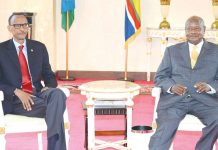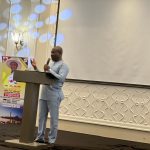𝐵𝑦 𝑃𝑎𝑡𝑟𝑖𝑐𝑘 𝑂𝑑𝑜𝑛𝑔𝑜 𝐿𝑎𝑛𝑔𝑜
Historically, for a mass uprising to occur, a revolutionary situation must exist, where the masses feel that their condition of living is intolerably wretched; when the ruling class has lost control, and there is widespread discontent so that a small spark would propel them to readily embrace a mass uprising aspiring to overthrow the status quo. Moreover, such a movement and its leadership must inspire hope and confidence in the masses, of their capability and competence to do better than the old regime they hope to overthrow.
When I hear proponents of the People Power movement claim that the country is “ripe for change”, I shudder at their wilful blindness and ignorance of “revolutionary conditions” that have historically given birth to mass uprisings and radical changes.
In more recent history, popular uprisings that followed the Arab spring were usually linked with general deprivations that sparked mass anger against sitting governments in the region. For instance, the spiraling price of bread led to the toppling of Omar el-Bashir in Sudan; the run-way inflation in Zimbabwe and the economic collapse that followed contributed to the fall of Robert Mugabe.
Contrastingly, Uganda has registered a bumper harvest this season in the countryside, where the mass of our people lives. The price for a bunch of matooke — the staple food for the majority has dropped to less than 10,000 Uganda Shillings. The majority of families in rural areas are food secure and take 3 square meals a day.
The urban dwellers, despite the challenges occasioned by COVID 19 restrictions and limited economic opportunities, are faring much better than expected by naysayers.
This good news is posing a serious messaging challenge to the people power agitators who have pivoted their whole movement on stoking anger, tribalism, and division.
Over the weekend the People Power agitators latched onto the arrest of the little known drama group, “Bizonto”, for breaching minimal broadcasting standards by seeking to stoke tribal hatred. It is a good thing that such dangerous instigation of hate is nipped in the bud. Throughout the world, broadcasting of racist and hate speech and symbols are prohibited and frowned upon by civilized societies. By happily embracing tribal hatred as their latest tactics, People Power have exposed themselves to not be up to the monumental task of leading a diverse country.
Given the conditions of the masses, the People Power movement is, therefore, finding it very hard to mobilize any popular anger against the NRM. Out of their depth, they are clutching onto any straws floating on social media even if it is abhorrent. We now know what people power is for: stoking tribal hatred and setting Ugandans against one another, instead of uniting them as one common family with a common destiny. Nelson Mandela once said that “may your choices reflect your hopes, not your fears”. We still don’t know the hopes of the People Power movement, but the signs so far are not encouraging.
The facts on the ground are giving them an uphill battle to fight. It’s ultimately a fight they will lose. Uganda is food secure. Ugandans are connected through marriage relationships and friendship. Kampala, which is a microcosm of Uganda, is a diverse city teeming with all nationalities and peoples of Uganda.
Despite the parochial agitation of the People Power movement, I am confident that common sense will eventually prevail, because Ugandans prefer peace and stability to the chaos the people power proposition engenders.
𝑇ℎ𝑒 𝑤𝑟𝑖𝑡𝑒𝑟 𝑖𝑠 𝑎𝑛 𝑁𝑅𝑀 𝑐𝑎𝑑𝑟𝑒 𝑓𝑟𝑜𝑚 𝑀𝑖𝑛𝑎𝑘𝑢𝑙𝑢 𝑖𝑛 𝑂𝑦𝑎𝑚 𝐷𝑖𝑠𝑡𝑟𝑖𝑐𝑡.
𝑝𝑎𝑡𝑟𝑖𝑐𝑘𝑜𝑑𝑜𝑛𝑔𝑜𝑠𝑛𝑟@𝑔𝑚𝑎𝑖𝑙.𝑐𝑜𝑚, 𝑇𝑤𝑖𝑡𝑡𝑒𝑟: 𝑝𝑎𝑡𝑟𝑖𝑐𝑘𝑜𝑑𝑜𝑛𝑔𝑠𝑛 𝐹𝑎𝑐𝑒𝑏𝑜𝑜𝑘: 𝑂𝑑𝑜𝑛𝑔𝑜 𝐿𝑎𝑛𝑔𝑜





















